Issue Brief
Create a Direct Pay Bond Program
Equip our Communities with a New Financing Tool

During the Great Recession, Congress temporarily authorized a direct pay bond program known as Build America Bonds, or BABs. Interest paid on these direct-pay bonds is taxable to the bondholder, so the interest rate is higher than a tax-exempt rate. The federal government, however, pays an amount equal to a percentage of the interest payable on the bonds directly to the issuer of the bonds, effectively reducing the financing cost of the project funded by these bonds.
Why We Care
The subsidy reduces the cost of financing infrastructure for state and local governments, while the taxable rates broaden the purchaser base by attracting new investors who would not otherwise be interested in tax-exempt bonds. By creating a new iteration of direct-pay bonds, Congress and the administration can add an additional, efficient, and tested financing tool for state and local governments.
NABL Stance
Congress and the Administration should create a new form of direct pay bonds to expand purchaser bases and provide a new financing tool to our communities. NABL endorses bills on a case-by-case basis but is supportive of efforts to create new direct pay bond programs. For further inquiries, email advocacy@nabl.org.
Latest on Direct Pay Bonds

LIFT Act Reintroduced in 118th Congress
The three-prong bill would restore tax-exempt advance refunding bonds, modernize the small borrower’s exemption, and implement a new direct pay bond program.

Update from D.C. (October 2023)
An October 19, 2023 update on NABL’s recent advocacy efforts, a recap of recent legislative and regulatory activity that we are tracking, and some discussion on what may be in…

Tax Hot Topics
This panel will discuss current federal tax issues, including any recently released notices, rulings, regulations and/or other guidance.